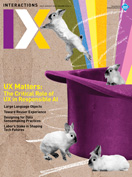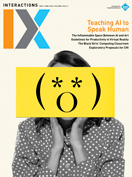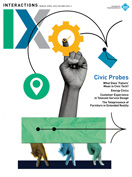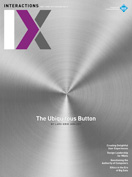Table of Contents
VOLUME XXI.3 May-June 2014
-
Demo Hour
-
Demo hour
Ryuma Niiyama, Hiroshi Ishii, Sean Follmer, Sheelagh Carpendale, Emre Karagozler, Ivan Poupyrev, Gary Fedder, Yuri Suzuki, Lining Yao, Jifei Ou, John Brosz, Miguel Nacenta, Richard Pusch, Christophe Hurter, Jun Rekimoto
1. Paper Generator The Paper Generator is a new energy-harvesting technology that generates electrical energy from user interactions with paper-like materials. These energy harvesters are flexible, lightweight, and inexpensive. They utilize a user's gestures such as tapping, touching, rubbing, and sliding to generate energy. The harvested energy is used…
-
-
What are you reading?
-
Charlotte Lee
Charlotte Lee

A Vast Machine: Computer Models, Climate Data, and the Politics of Global Warming By Paul Edwards (2010) Sometimes the right book comes across one's radar at just the right time. In the course of researching how scientists reuse or contribute "small data" in relationship to infrastructural, scientific, and computing…
-
-
How was it made?
-
Polymetros

Describe what you made. Polymetros is an interactive, collaborative music system that enables you to play, compose, and perform music together with your friends or someone you just met. Designed as an audience experience for festivals and exhibitions, Polymetros promotes a way of making music that is immediate, intuitive,…
-
-
Departments
-
Welcome: What’s in the details?
Ron Wakkary, Erik Stolterman
CHI 2014 will soon be here—maybe you are even reading this at the conference in Toronto. The CHI conference is the major event of the year for HCI, for academics as well as for many professionals. CHI is constantly growing. Last year the conference hosted about 3,500 participants in…
-
See you next year in Seoul
Gerrit van der Veer

In the past few years, we have seen a steady increase in Korean participation at SIGCHI events. In February I attended HCI Korea 2014, an annual conference that in recent years has drawn around 2,000 participants. This meeting takes three days and includes about 10 parallel tracks. Some of…
-
Community calendar

May Graphic Interface 2014 – 40th Graphic Interface Conference (Montreal, Canada) Conference Dates: May 7–9, 2014 http://www.cs.mcgill.ca/~kry/gi2014/ Persuasive 2014 – 9th International Conference on Persuasive Technology (Padua, Italy) Conference Dates: May 21–23, 2014 http://www.persuasive2014.org/ W2GIS 2014 – Web and Wireless Geographical Information Systems International Symposium (Seoul, Korea) Conference Dates:…
-
-
Columns
-
Big data, diminished design?
Daniela Rosner, Jonathan Bean

In 1901, Australia's prime minister, Edmund Barton, asked citizens to design the country's first national flag. The winning selection combined elements of the British flag, visible in many of the more than 30,000 entries submitted. According to historian Carol Fowley [1], many Australians remain unconvinced of the appropriateness of…
-
Reasons to be cheerful
Elizabeth Churchill

While I was watching the news the other day, it struck me that I need a gloom-reduction strategy. I recently reviewed a number of fitness applications, some of which were quite good, so this set me to wondering, Is there an app for that? An app that claims it…
-
Design and ethics in the era of big data
Elizabeth Goodman

In 2003, I was working at a research lab on what then seemed like a new and unmapped field: urban computing. We envisioned a network of devices that would playfully engage urban dwellers with the strangers around them. In an initial vision, sensors at points of interest, such as…
-
-
Day in the Lab
-
WHCI Lab, Wellesley College
As told by Orit Shaer How do you describe your lab to visitors? In the WHCI Lab, we are exploring how novel user interfaces can benefit and enhance creativity, collaborative learning, and discovery, especially in data-intensive areas. Our lab integrates teaching and research in a liberal arts college environment…
-
-
Forums
-
Designing for dream spaces
Kasia Warpas

Due to pressure to increase visitor numbers, museums have increasingly worked to attract new audiences to their exhibitions, especially children. One common approach is to use digital technologies to craft interactive installations that are then placed inside the exhibition space. These multimedia exhibits are intended to entertain, animate, and…
-
Public policies and multilingualism in HCI
Fabio Paternò, Marco Winckler, Loïc Normand

The design principle "speak the user's language" underpins the universal idea that interactive systems should be able to process and display information not only in the user's native language but also in an understandable and meaningful way, and, if possible, should also accommodate the user's cultural background. This is…
-
Design leadership for mergers and acquisitions
Janaki Kumar, Philip Haine, Michael Brown

Are you a user experience (UX) team manager affected by a merger or acquisition (M&A)? If so, you are not alone. M&A is a common business expansion strategy in the technology industry. To name a few large acquisitions in the recent decade: Oracle acquired PeopleSoft, Siebel, and Sun Microsystems;…
-
-
Features
-
Playful or gameful? Creating delightful UX
Andrés Lucero, Evangelos Karapanos, Juha Arrasvuori, Hannu Korhonen

For many of us non-digital-natives over 30, our first contact with interactive technology came about through playing video games. Long before personal computers and mobile phones became part of our daily lives, we were already hooked on these games. In places as diverse as Chile, Greece, and Finland, at…
-
Reducing legacy bias in gesture elicitation studies
Meredith Morris, Andreea Danielescu, Steven Drucker, Danyel Fisher, Bongshin Lee, m. schraefel, Jacob Wobbrock

Gesture-based systems are becoming ubiquitous. Tablets, phones, large displays, and even laptop computers are now commonly equipped with multitouch-recognizing screens. Third-party accessories like the Wii Nunchuck and the Xbox Kinect can also detect rich gestural input. To design for these increasingly prolific gesture-based systems, we need to understand how…
-
Reflecting our better nature
Deborah Tatar

Computerization has moved from providing a counterpoint to life, with the potential to highlight and shade experience, to constituting a constant force, defining life as experienced. The co-evolution of computing and society means that even the central tenets of HCI are subject to questioning and refinement. Gilbert Cockton put…
-
Real-time captioning with the crowd
Jeffrey Bigham, Walter Lasecki

Automatically providing access to information for people with disabilities when and where they need it requires solving some of the most difficult problems in computing. A characteristic example that we have been looking at is the real-time conversion of speech to text. Real-time captioning allows deaf and hard of…
-
Integrating color usability components into design tools
Montgomery Webster

The academic community has produced extensive documentation of usability and accessibility principles. Much of this work has been wholeheartedly adopted on an international scale, for example, by the International Organization for Standardization (ISO) [1], and is required by law in some countries [2]. Nevertheless, one branch of usability continues…
-
Fast, cheap, and powerful user research
Jennifer McGinn, Christopher LaRoche

As UX professionals, we often hear that there is no time or budget to conduct user research—sometimes from our peers [1]. By contrast, we want to assure you that in addition to creating an inexpensive mobile lab [2], you can conduct user research on any budget and any timeline,…
-
-
Visual thinking gallery
-
Belongings considered harmful
Eli Blevis

Genre: Humor, unintended meanings A sign—illustrated with smartphone and purse icons—advises "Beware of your belongings," which has the sense that your belongings might hurt you. This is not quite the same as "Be aware of your belongings," which has the sense that someone may try to steal your belongings,…
-



